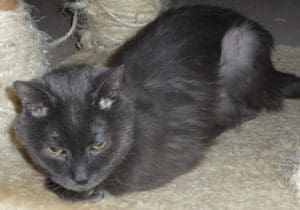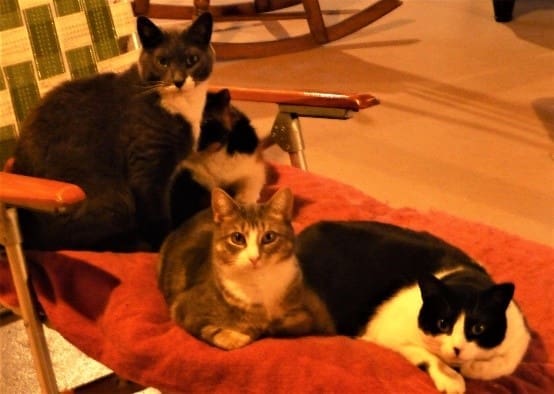Hello! Hope you are having a good day.
Do you ever think about things that happened to you years ago, maybe when you were a child or teenager? This morning I was thinking about my early history, living with my mother, my sisters and my brothers in the “wilds” of Mountainside, New Jersey. We were hungry much of the time but we had lots of fun together, romping and chasing.
My life changed when I came to the cloister as a kitten. I certainly had not intended on becoming a Benedictine, but that is what has happened. Because she was worried about me living through the coming winter, Amma caught me in a Have-A-Heart trap. I was quickly taken to the vet to “get fixed.” That was scary. I’d never been near people before. Amma and the Vet had a serious conversation about me being what is called “a feral cat.”
Ricky Discovers a Hurtful Label
Not knowing what the term “feral” meant, when I was a little older I decided to check its meaning in a dictionary. Pawing through the pages to this word, I was horrified by what I read! Phrases like “relating to or suggestive of a wild beast” and “not domesticated or cultivated” broke my heart. I felt so hurt. Doesn’t Amma know my gentle nature?
I’m not wild. I have a cultivated side, otherwise I wouldn’t read and do my best to follow the Rule of St. Benedict. I love the other cats. They don’t give me the label “feral cat.” They know me and accept me for who I am.
Why do humans give generalized labels to other people and to animals like me? My guess is that it must make them feel superior to whomever they give the label. It certainly shows that the labeler hasn’t made an effort to really get to know the labelee. It’s unfair and hurtful and very unBenedictine.
The Rule of St. Benedict On Labeling
In culling The Rule of St. Benedict I didn’t find any directives not to “label” others, using that specific term. Instead, Benedict focuses on the kind of persons/felines we are to be in our relationships with others – respectful, humble, caring, obedient and responsive to the needs of the other. These instructions will overshadow any thought of labeling others in a disrespectful and negative way.
When we label others it is like we are physically striking them. In the Cloister we are never to strike a sister or brother at will as Benedict prescribes in Chapter 70. Quoting the Book of Tobit, Benedict also writes, “After all, it is written: Never do to another what you do not want done to yourself.” (Tob 4:16 and RB 70. 7) So, if I am ever tempted to give a disparaging label like “heathens” to felines who are not part of our Cloister, I am going to remember that I don’t want any kind of label. Benedict asks me to respect others.
Today, groups of people are struck by unfair labels because of their ethnic origins, skin color, type of job, religious beliefs or sexual orientation. In Chapter 4 – The Tools for Good Works, Benedict’s reminds us of the priorities we are to have before us.
“Your way of acting should be different from the world’s way; the love of Christ must come before all else.” RB 4.20-21
Ricky Practices Jesus’ Great Commandment
I don’t want to be unkind or hurtful to one of my sisters or brothers in the cloister and that’s why I take to heart Benedict’s first tool in Chapter 4 – The Tools for Good Works. Benedict says, “First of all, love the Lord your God with your whole heart, your whole soul
and all your strength, and love your neighbor as yourself”. RB 4.1-2 Here Benedict is quoting Jesus’ Great Commandment. I really try to do all three to my very best. It’s so important to watch what we say or how we speak of other cats…or people, too. I try not to say too much and have always really like what Benedict says in Chapter 6 – Restraint of Speech. He encourages us to refrain from speech because, quoting Proverbs, “In a flood of words you will not avoid sin” (RB 6.4 and Prov 10:19). Isn’t that true?? Sometimes mewing nothing is the most loving action.
St. Benedict’s Advice to Stay the Course
With all this I have shared with you, wouldn’t you agree that calling me “feral” isn’t fair? Are these the mews of a “wild and uncultivated” cat? Well, Benedict encourages us to “bear injuries patiently” (RB 4.30b) and quietly embrace suffering, not weakening or seeking escape (RB 7.35-36). So I take a deep breath, turn to Christ and let him help me do my best to ignore this labeling, confident that God will reward me if I stay the course faithfully (RB 7.39). We can’t do anything about what others say about us but we can take a broader view and let it go. We can mew a prayer for the person or animal, too. That will change our hearts which is really the only thing that we can change.
Living the Great Commandment and the love of Christ first, we will turn from all those labels to practice love, not labeling.
I hope you found this helpful.
A quick word about the cloister. We lost dear Smokey last month. She was 15. She and her sister Marcy, who joined the Paradise Cloister in November 2012, were rescued by Amma in the parking lot of her church way back in 1999. There are just three of us now – me, Target and Charlotte. Things are really quiet.
Your loving feline Benedictine friend,
Ricky








